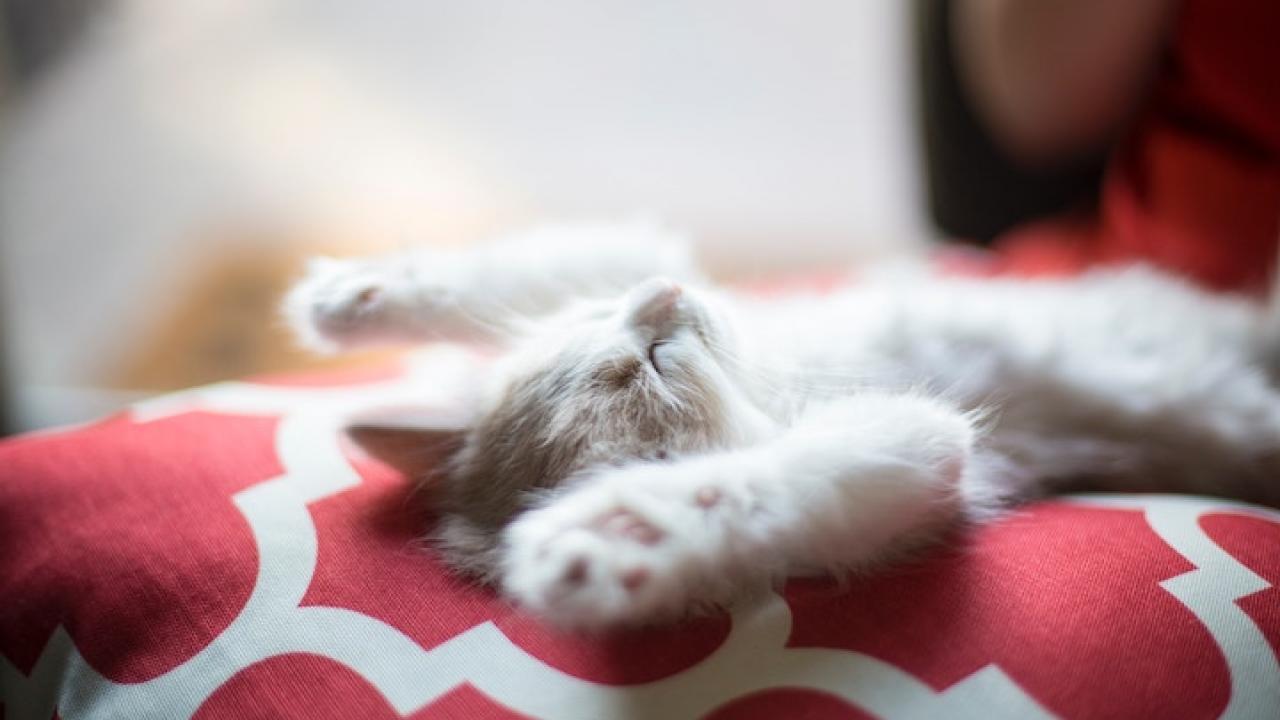
Kitten Play: Rough Isn't Right
Kitten Play: Rough Isn’t Right
How we can help
Call 530-752-1393 to schedule an appointment with the Behavior Service.
Download PDF of this "Kitten Play: Rough Isn’t Right" article
Congratulations on acquiring your new kitten! We know that having an addition to the family can be an exciting and fun time. In order to maintain a healthy relationship with your new cat, it is important to teach him (or her) the proper way to play and interact with you and other members of your household.
Play is an important part of kitten development. Kittens use play to explore their environment, to establish social relationships, and to learn their boundaries. During normal kitten development, kittens begin socializing with their littermates at 4-7 weeks. From weeks 7-14, kittens have their most active play period, but the kitten-like play behavior usually persists in cats up to 2 years of age. Hand-raised kittens or kittens that are weaned too early lack normal socialization opportunities that they would normally get with littermates and their mother and may require special attention during play time. Appropriate kitten play should be started at an early age, and it may be up to you to properly socialize your kitten in order to minimize the risk of painful bites, scratches or other inappropriate behavior.
Positive Play
Because play is an essential part of kitten development, set aside some time every day to play with your kitten. Use a variety of toys such as ping-pong balls, soft stuffed animals, crinkly paper objects, feather toys and non-chewable sticks. Provide positive reinforcement of good play behavior. Play in itself can be used as a reward, but you can also provide treats and verbal praise for appropriate play behavior. Independent play is also important for establishing a healthy kitten lifestyle, so be sure to provide plenty of toys for your kitten to enjoy while you are away.
If your kitten is already showing signs of rough play, it is important to address this issue as soon as possible. At the first sign of aggressive play, quickly remove your hands or feet from their reach. Hands should only be associated with petting, comforting and positive interaction with your kitten. Re-direct their attention with a proper toy from a distance or simply leave the room. They should NOT be allowed to continue playing with fingers or toes. If your kitten is using his claws too frequently and is scratching his people playmates, re-direct this scratching to a scratching post. Scratching posts, especially those with a toy at the top, are also a great way to introduce your kitten to his proper place for scratching. Rewarding a kitten after using the scratching post is important in order to encourage appropriate scratching behavior.
While positive reinforcement of good behavior is the best training method, surprise aversive techniques or remote punishment such as a water spray or loud noise at the beginning of aggressive play may aid in discouraging bad behavior. Please consult with your veterinarian or behavioral specialist before trying these techniques.
Avoiding Aggression
NEVER use your fingers or toes to play with the kitten. What might be cute at 10 weeks is painful at 10 months! Responding to a kitten’s forceful rough play with force is inappropriate and must be avoided. Never hit, swat at, or scruff your kitten as this may inadvertently injure your kitten. They may also develop into a fear of people and may even cause the kitten to become aggressive towards hands and feet if they learn to associate them with fear or pain. Yelling is also inappropriate because a young kitten will become fearful of your voice. Their ears are far more sensitive to sound so yelling can be extremely loud and frightening to them; a stern voice would be far more productive in getting their attention.
Do not attempt to pick up your kitten during rough play as this may result in injury to someone. Picking up the kitten may also be perceived as a reward, or may confuse the kitten because he may not associate the rough play with the physical removal from play.
As with all training methods, consistency is the key to success. Everyone in your household should understand and implement these methods to reinforce positive, non-aggressive kitten play. Young children should always be supervised during their time with the kitten.
Cat scratches and bites should be washed thoroughly with soap and water. Puncture wounds require immediate medical attention.
TRAINING SUMMARY
- Training Do’s
- Encourage acceptable behavior
- Set aside playtime everyday
- Reward good play behavior with treats, affection, or praise
- Redirect undesirable behavior
- Provide a positive alternative
- Avoid situations that provoke this behavior
- Remove yourself from play immediately & ignore kitten if play becomes rough
- Consistency is key: have house “rules” for playing with the kitten
- Encourage acceptable behavior
- Training Don’ts
- Never use hands or feet as a toy
- Don’t scruff, tap your kitten on its nose, or hit your kitten
- Don’t yell at your kitten
- Don’t pick up kitten to remove from behavior, as this can reinforce the behavior
If your kitten does not respond to gentle play, or exhibits persistent aggression and/or other problems, consult with your veterinarian as soon as possible.
*This article may not be reproduced without the written consent of the UC Davis School of Veterinary Medicine.
